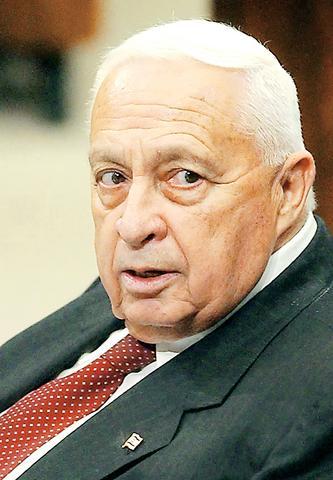Buoyed by opinion polls, Israeli Prime Minister Ariel Sharon vowed yesterday to forge a new government if pro-settler coalition partners try to block his plan to evacuate Jewish settlements in the Gaza Strip.
Once considered the godfather of the settlement movement, Sharon won a confidence vote in parliament by a single vote late on Monday after saying he had ordered that plans be drawn up to remove 17 of the 20 Gaza enclaves.

PHOTO: AP
The announcement, which stunned friends and foes alike, marked the first time Sharon had revealed details for such an extensive pullout from land Israel captured in the 1967 Arab-Israeli war.
While Sharon's ruling coalition is in turmoil, an opinion poll published yesterday in the Yedioth Ahronoth newspaper showed 59 percent of Israelis supported uprooting Gaza settlements and 34 percent opposed such a move.
In remarks published yesterday elaborating on the initiative, Sharon said the process would take one to two years and would include evacuation of three of the more than 120 settlements in the West Bank.
"I am working on the assumption that in the future there will be no Jews in Gaza," he said in an interview with the daily Haaretz.
He said he would seek US approval and financial aid to "relocate" about 7,500 settlers from the strip.
Polls show Israelis largely willing to part with Gaza. Its enclaves require a heavy military presence to protect and have little of the biblical significance that draws Jews to the West Bank, where more than 200,000 settlers live.
Sharon's plans, laid out to his right-wing Likud party in a tense meeting on Monday, enraged members of the Jewish settler movement he championed for decades.
A Cabinet minister from the far-right National Religious Party, one of Sharon's coalition partners, responded with a threat to resign after storming out of parliament and abstaining from the confidence vote.
"We won't participate in this," Housing Minister Effi Eitam told Israel Radio of Sharon's plans to evict settlers.
If Sharon presents such a plan to the US, "the timing of our departure would be merely tactical," he said.
The National Religious Party, headed by Eitam, has six seats in parliament, and if it left the coalition Sharon would command a shaky 62-58 majority in the 120-member legislature, including another seven-seat pro-settler party.
"I will not hesitate to set up another government," Sharon told Yedioth Ahronoth. "Not that I am rushing to take such a step, but I have no intention of being at the mercy of factions ... that won't permit me to handle matters of state."
Palestinians and Israel's left-wing opposition met Sharon's plan with skepticism, and some critics suggested he was trying to distract public attention from a widening corruption probe focusing on him and his family. Sharon denies any wrongdoing.

AGING: As of last month, people aged 65 or older accounted for 20.06 percent of the total population and the number of couples who got married fell by 18,685 from 2024 Taiwan has surpassed South Korea as the country least willing to have children, with an annual crude birthrate of 4.62 per 1,000 people, Ministry of the Interior data showed yesterday. The nation was previously ranked the second-lowest country in terms of total fertility rate, or the average number of children a woman has in her lifetime. However, South Korea’s fertility rate began to recover from 2023, with total fertility rate rising from 0.72 and estimated to reach 0.82 to 0.85 by last year, and the crude birthrate projected at 6.7 per 1,000 people. Japan’s crude birthrate was projected to fall below six,

Conflict with Taiwan could leave China with “massive economic disruption, catastrophic military losses, significant social unrest, and devastating sanctions,” a US think tank said in a report released on Monday. The German Marshall Fund released a report titled If China Attacks Taiwan: The Consequences for China of “Minor Conflict” and “Major War” Scenarios. The report details the “massive” economic, military, social and international costs to China in the event of a minor conflict or major war with Taiwan, estimating that the Chinese People’s Liberation Army (PLA) could sustain losses of more than half of its active-duty ground forces, including 100,000 troops. Understanding Chinese

US President Donald Trump in an interview with the New York Times published on Thursday said that “it’s up to” Chinese President Xi Jinping (習近平) what China does on Taiwan, but that he would be “very unhappy” with a change in the “status quo.” “He [Xi] considers it to be a part of China, and that’s up to him what he’s going to be doing, but I’ve expressed to him that I would be very unhappy if he did that, and I don’t think he’ll do that. I hope he doesn’t do that,” Trump said. Trump made the comments in the context

SELF-DEFENSE: Tokyo has accelerated its spending goal and its defense minister said the nation needs to discuss whether it should develop nuclear-powered submarines China is ramping up objections to what it sees as Japan’s desire to acquire nuclear weapons, despite Tokyo’s longstanding renunciation of such arms, deepening another fissure in the two neighbors’ increasingly tense ties. In what appears to be a concerted effort, China’s foreign and defense ministries issued statements on Thursday condemning alleged remilitarism efforts by Tokyo. The remarks came as two of the country’s top think tanks jointly issued a 29-page report framing actions by “right-wing forces” in Japan as posing a “serious threat” to world peace. While that report did not define “right-wing forces,” the Chinese Ministry of Foreign Affairs was